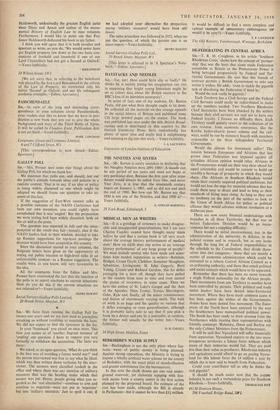DE-FEDERATING IN CENTRAL AFRICA
SIR,—T. R. M. Creighton, in his article 'Southern Rhodesian Crisis,' shows how the concept of 'partner- ship' that was the basis that alone made Federation acceptable to Britain as the Protectorate Power is being betrayed progressively by Federal and Ter- ritorial Governments. He sees that this breach of contract permits a British Government to take any action it wishes. He adds: 'even to tackle the gigantic task of dissolving the Federation if need be.'
Would the task really be gigantic?
Each Territory has a Civil Service and the Federal Civil Servants could easily be redistributed to make up the numbers needed. Two Northern Rhodesian Chief Secretaries have been attacked by the settlers because their civil servants are said not to have any Federal loyalty. I foresee no difficulty there. Each Territory could quickly revert to the collection of its own revenue. Joint ecpnomic enterprises, like the Kariba hydro-electric power scheme and the rail- ways, could be run by statutory boards with members responsible to the three independent Territorial Governments.
Would the climate for investment suffer? The tension between Europeans and Africans that has grown since Federation was imposed against all -articulate African opinion would relax. Africans in the Protectorates would see their way clear ahead for equal citizenship and would be content to build up steadily a heritage of prosperity in which they would share. The Africans in Southern Rhodesia would retain their recently acquired political ambitions, but would not lose the urge for material advance that has made them easy to direct and lead as long as their standards of living were rising. As long as they saw no tendency on the part of the settlers to look to' the Union of South Africa for policy or political alliance they would advance without revolution at a deliberate pace.
There are now many financial undertakings with branches in all three Territories, but that was so before Federation. Division would be an incon- venience but not a crippling difficulty:
There would be initial inconvenience, too, in the administration of the university, in defence, in the judicial system and in research, but as one looks through the long list of Federal responsibilities in the schedule to the Constitution, they divide them- selves into two categories : those that are mainly a matter of economic administration which could be entrusted to a reborn Central African Council as a co-ordinating authority, and those that entail political and social contacts which would have to be separated.
Remember that there has been no move towards a single Federal nationality for the African people. Their movements from one Territory to another have been controlled by permits. Their political and trade union leaders have been denied inter-Territorial movement. Where they have made common cause it has been against the wishes of the Governments. Asians have been denied free movement. The Euro- peans of the North have been annoyed by the way the Southerners have monopolised political power. The South has been ready to draw revenue from the Northerners while treating their representatives with friendly contempt. Welensky, Owen and Barlow are the only Cabinet Ministers from the Protectorates.
It will be said that Nyasaland will suffer financially from separation. Nyasaland exports to the two more prosperous territories a labour force without which many of their industries would fail. They are paid less than their value as producers. Rhodesian industry and agriculture could afford to go on paying Nyasa- land for this labour force the £4 million a year by which she is now said to benefit from Federation.
Could your contributor tell us why he thinks the task gigantic?
It should be much easier now that the copper industry is not such a tremendous prize for Southern 296 Vauxhall Bridge Road, SW I


































 Previous page
Previous page